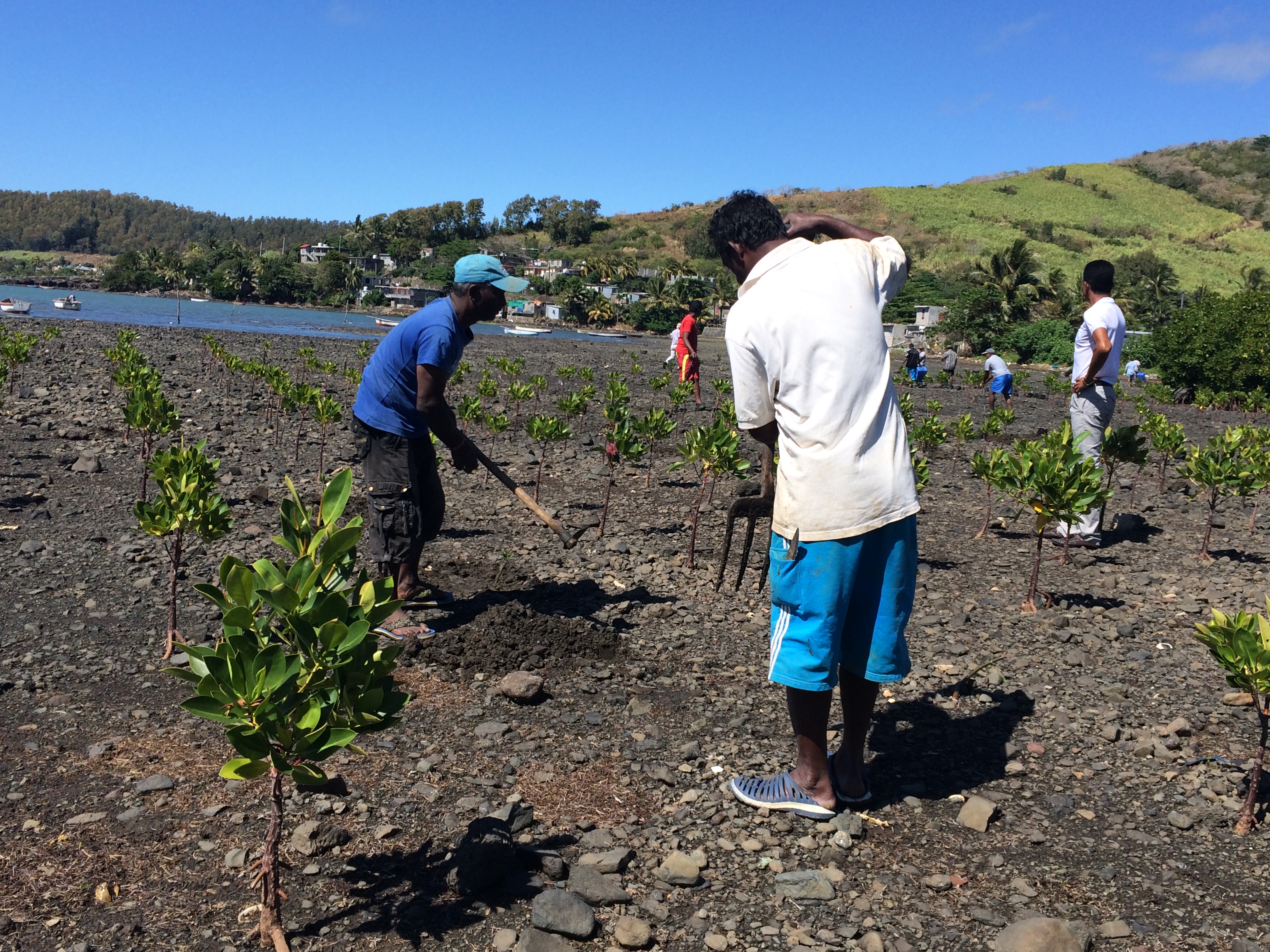Adaptation Fund: Building Resilience to Climate Change and Disasters in Pacific and other Small Island Developing States
Press Event Focused on New Projects in Fiji and Solomon Islands with UN-Habitat
Bonn, Germany (November 15, 2017) — The Adaptation Fund hosted a press event focused on increasing resilience to climate change and disasters among vulnerable urban communities in Fiji, Solomon Islands and other small island developing states (SIDS), during the UN Climate Conference in Bonn this week.
The Fund and its accredited multilateral implementing entity, UN-Habitat, discussed new projects in Fiji and the Solomon Islands. Both projects were approved by the Adaptation Fund Board in October, are funded by the Adaptation Fund and implemented by UN-Habitat.
The press event, held November 15 from 10-10:30 am in Press Conference Room 1 of the Bula Zone, is available by webcast on the UN Framework Convention on Climate Change website.
The Fund also briefly discussed its overall SIDS portfolio, which to date has allocated US$ 110.4 million covering 15 concrete adaptation projects and readiness support in 17 SIDS countries benefiting nearly 900,000 direct beneficiaries, restoring 8,300 ha of natural habitat, training 7,700 people in climate resilience measures and protecting nearly 100 km of coastlines.
“As we see rising seas, floods, droughts, intense storms and changes to agriculture and fishing, small island developing states are particularly vulnerable to the negative effects of climate change,” said Adaptation Fund Board Chair Michael Kracht. “The Adaptation Fund is focused on funding concrete adaptation projects to the most vulnerable communities in developing countries, and SIDS are a big part of that.”
Under the Fund’s pioneering Direct Access modality, which builds country capacities to adapt to climate change, nearly 45 percent of its accredited national implementing entities are in SIDS or least developed countries. The Fund further established a streamlined accreditation process that has opened doors to climate finance for smaller entities, including those from SIDS.
“UN-Habitat’s partnership with the Adaptation Fund is proving to be a highly effective way to help some of the poorer communities, particularly in the hard-hit Small Island Developing States, adapt to climate change,” said Ms. Shipra Narang Suri, PhD, Coordinator of UN-Habitat’s Urban Planning and Design Branch. “Our work in Fiji and Solomon Islands will directly support some of the most vulnerable populations, while at the same time building capacities within national and local governments to plan and implement policy interventions and undertake necessary institutional strengthening.”
The US$ 4.4 million project in the Solomon Islands in Honiara will enhance urban resilience to climate change and natural disasters.
“The project will directly enhance the resilience of some of the most vulnerable informal settlement communities including two coastal settlements which are affected by storm surge, sea level rise and diminishing livelihoods as well as several inland informal settlements which experience increased flooding and landslides,” said Mayor of Honiara, Andrew Mua. “In order to sustain and to build on these community level actions, the project will also strengthen capacities at the ward and city levels. On behalf of Honiara City Council, I express my deep appreciation for the approval by the Adaptation Fund Board of the project. [It] will help to materialize strategic priorities of the Honiara Urban Resilience and Climate Action Plan, which was jointly endorsed by Honiara City Council, the Ministry of Lands, Housing and Survey and the Ministry of Environment, Climate Change, Disaster Management and Meteorology in early 2017.”
Meanwhile, the US$ 4.2 million Fiji project will enhance resilience to climate change and disaster risks among highly vulnerable informal urban settlements in riverbanks and coastal lands. Through a community-based process, it will increase the adaptive capacity of 6,000 people, including at least 50 percent women. Physical infrastructures will be improved to withstand extreme weather, and natural protective ecosystems will be restored to enhance climate resilience. Another 220 people will be trained in cyclone resilient construction methods, microfinance and coastal zone management.
“It means a great deal to Fiji, which is prone to cyclones, sea rise, flooding and droughts,” said Hon. Lorna Eden, Fiji’s Assistant Minister for Local Government, Housing and Environment, the executing entity of the project, during an Adaptation Fund side event on November 9 at the UN Climate Conference in Bonn. “With a focus on the most vulnerable, the Adaptation Fund is in a unique position to help. Its portfolio includes 15 projects in 14 SIDS countries – including Fiji, Solomon Islands, Samoa and Cook Islands. The [Fiji] project has a strong knowledge sharing component to raise awareness of climate risks and best practices, and is highly transparent. All stakeholders – from the government to the local level – will be involved in its implementation, review and ultimately its success. It is a great example of the vision of Fiji’s COP23 Presidency to harness innovation to fast-track the deployment of climate solutions to build future sustainable economies, and the ‘Bula’ spirit of inclusiveness, collective action, listening, learning and sharing.”
These are also aligned with the strategic pillars of the Adaptation Fund – Action, Innovation and Learning – as it celebrates the 10th anniversary of the launch of its operations this week in Bonn.
ABOUT the ADAPTATION FUND
Since 2010, the Adaptation Fund has committed US$ 462 million to support 73 countries, with nearly 5.5 million direct beneficiaries.
Communications: Matthew Pueschel, mpueschel@adaptation-fund.org or +1-202-473-6743
Attachments
| Attachment | Type | Size |
|---|---|---|
| Press release November 15, 2017 | 376 KB |


